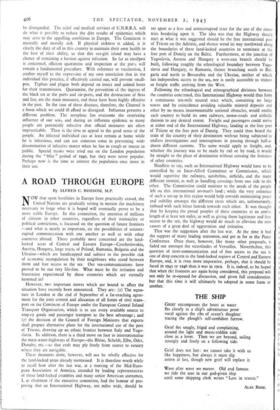A ROAD THROUGH EUROPE
By ALFRED C. BOSSOM, M.P.
NOW that open hostilities in Europe have practically ceased, the United Nations are gradually setting in motion the machinery necessary to forge what it is hoped will eventually prove to be a more stable Europe. In this connection, the attention of millions of citizens in other countries, regardless of their nationality or political convictions, is focussed on the question of future frontiers —and what is nearly as important, on the possibilities of uninter- rupted communication with one another as well as with other countries abroad. Those probably most concerned are the land- locked areas of Central and Eastern Europe—Czechoslovakia, Austria, Hungary, large tracts of Poland, Rumania, Bulgaria and the Ukraine—which are handicapped and subject to the possible risk of economic strangulation by their neighbours who stand between them and free access to the sea. Our sea-communications have proved to be our very life-line. What must be the irritation and frustration experienced ' by those countries which are eternally hemmed in?
However, two important moves which are bound to affect the situation have recently been announced. They are: (t) The signa- ture in London at the end of September of a far-reaching agree- ment for the joint control and allocation of all forms of civil trans- . port on the Continent of Europe under the European Central Inland Transport Organisation, which is to use every available source to emp.oy goods and passenger transport to the best advantage ; and (2) the decision of the Council of Foreign Ministers that experts shall prepare alternative plans for the international use of the port of Trieste, drawing up an ethnic frontier between Italy and Yugo- slavia. In addition, there is a third move on foot to internationalise the main water-highways of Europe—the Rhine, Scheldt, Elbe, Oder, Danube, etc.—so that craft may ply freely from source to estuary where they are navigable.
These measures alone, however, will not be wholly effective for the land-locked areas already mentioned. It is therefore worth while to recall how after the last war, at a meeting of the Mid-Euro- pean Association of America, attended by leading representatives of these land-locked countries and many senior American statesmen, I, as chairman of the executive committee, had the honour of pro- posing that an International Highway, ten miles wide, should be set apart as a free and uninterrupted tract for the use of the coun- tries bordering upon it. The idea was that the Highway should start at what it was suggested should be the free international port of Trieste on the Adriatic, and thence wend its way northward along the boundaries of these land-locked countries to terminate at the free port of Danzig on the Baltic. Furthermore, at the junction of Yugoslavia, Austria and Hungary a west-east branch should be built, following roughly the ethnological boundary between Yugo- slavia and Hungary, to Rumania, thence branching south to Bul- garia and north to Bessarabia and the Ukraine, neither of which has independent access to the sea, nor is easily accessible to visitors or freight traffic arriving from the West.
Following the ethnological and ethnographical divisions between the countries concerned, this International Highway would thus form a continuous ten-mile neutral tract which, containing no large towns and by coincidence avoiding valuable mineral deposits and other by no means insurmountable national obstacles, would enable each country to build its own railways, motor-roads and airfields thereon to any desired extent. Freight and passengers could arrive at either end of the International Highway, landing at the free port of Trieste or the free port of Danzig. They could then board the train of the country of their destination without being subjected to endless investigations and interruptions in passing through half-a- dozen different customs. The same would apply to freight, and, whether the journey was to be made by rail or by road, it would be straight to the place of destination without crossing the frontiers of other countries.
Needless to say, such an International Highway would have to be controlled by an Inter-Allied Committee or Commission, which e would supervise the railways, autobahns, airfields, and the many 1 different termini, as well as handling crossings from one side to the other. The Commission could minister to the needs of the people i left on this international no-man's land ; while the very existence i of such a set-up in this region would help towards maintaining peace e
and stability amongst the different races which are, unfortunately, r
imbued with such bitter hatreds towards each other. It was thought r that by keeping the proud peoples of these countries at an arm's- s length of at least ten miles, as well as giving them legitimate and free access to the sea, the highway would do much to alleviate the root causes of a great deal of aggravation and irritation.
That was the suggestion after the last war. At the time it had the support of many leading statesmen, and got as far as the Peace Conference. Once there, however, like many other proposals, it faded out amongst the vicissitudes of Versailles. Nevertheless, this question of inter-communication and of free access to the sea is one of deep concern to the land-locked regions of Central and Eastern Europe, and, it is even more imperative, perhaps, that it should be faced in 1945 or 1946 than it was in 1919. It is, indeed, to be hoped that when the frontiers are again being considered, this proposal will not only be re-opened for discussion, and given full consideration, but that this time it will ultimately be adopted in some form or another.






























 Previous page
Previous page